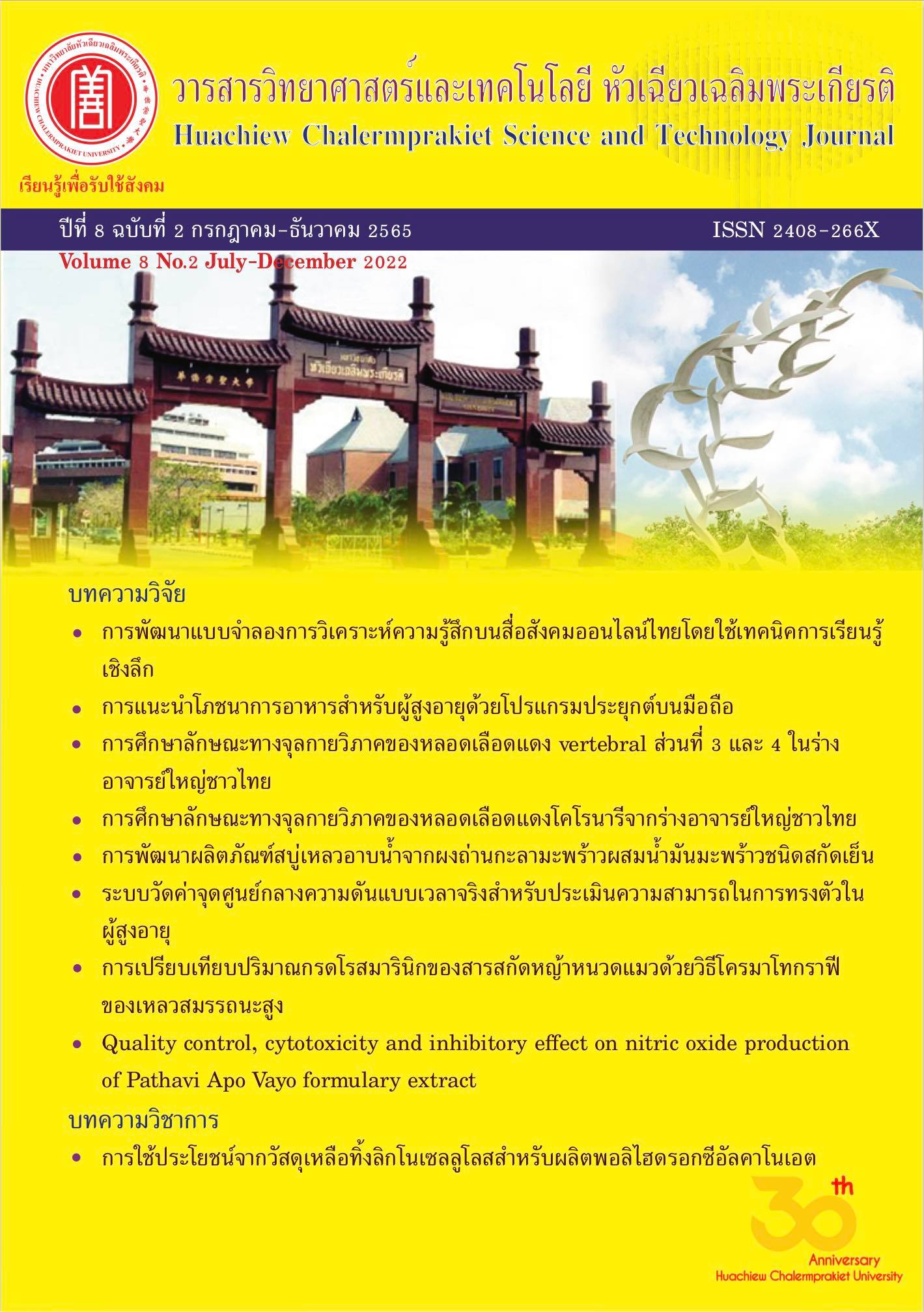การพัฒนาแบบจําลองการวิเคราะห์ความรู้สึกบนสื่อสังคมออนไลน์ไทยโดยใช้เทคนิคการเรียนรู้เชิงลึก
คำสำคัญ:
เทคนิคการเรียนรู้เชิงลึก, หน่วยความจำระยะยาว-ระยะสั้น, โครงข่ายประสาทแบบคอนโวลูชัน, การวิเคราะห์ความรู้สึก, หน่วยเวียนกลับแบบมีประตูบทคัดย่อ
งานวิจัยได้นำเสนอการพัฒนาแบบจําลองการวิเคราะห์ความรู้สึกบนสื่อสังคมออนไลน์ไทยโดยใช้เทคนิคการเรียนรู้เชิงลึกประกอบด้วย โครงข่ายประสาทแบบคอนโวลูชัน (Convolutional Neural Network) หน่วยความจำระยะยาว-ระยะสั้น (Long Short-Term Memory) และ หน่วยเวียนกลับแบบมีประตู (Gated Recurrent Unit) โดยการทดสอบกับชุดข้อมูลความคิดเห็นต่อสินค้าและบริการของเว็บวงใน (Wongnai) เมื่อวัดประสิทธิภาพจากค่าความถูกต้อง พบว่าแบบจำลองที่ดีที่สุดคือหน่วยความจำระยะยาว-ระยะสั้นมีความถูกต้องในการจำแนกสูงถึง 83.7% รองลงมาเป็น โครงข่ายประสาทแบบคอนโวลูชันมีประสิทธิภาพความถูกต้องในการจำแนก 77.0% ตามมาด้วยหน่วยเวียนกลับแบบมีประตู มีความถูกต้องในการจำแนก 65.4% ตามลำดับ ดังนั้นจึงสรุปได้ว่าแบบจำลองหน่วยความจำระยะยาว-ระยะสั้นมีความเหมาะสมและมีประสิทธิภาพที่จะนำไปสร้างระบบวิเคราะห์ความคิดเห็นอัตโนมัติอันเนื่องจากอัลกอริทึมชนิดนี้มีการพิจารณาบริบทของคำในภาษาไทย และถูกออกแบบมาสำหรับการประมวลผลแบบลำดับตลอดจนมีหน่วยความจำภายในตัวเอง
เอกสารอ้างอิง
Sharma D, Sabharwal M, Goyal V, Vij M. Sentiment Analysis Techniques for Social Media Data: A Review. In: proceedings of the First International Conference on Sustainable Technologies for Computational Intelligence. Advances in Intelligent Systems and Computing: Vol. 1045. Singapore: Springer; January 2020. p.75-90.
Ahmad R, Shaikh Y. Opinion Mining and Sentiment Analysis for Classification of Opinions on Social Networking Sites Using Machine Learning Algorithms: Systematic Literature Review. Int j adv res comput commun eng 2021;10(5):488-94.
Wongnai. [Internet].2022 [cited 2022 June 30]. Available from: https://www.wongnai.com/businesses?domain=1
Tesmuang R, Chirawichitchai N. Thai Sentiment Analysis of Product Review Online Using Genetic Algorithms with Support Vector Machine. J Appl Sci Adv Technol 2020;10(2):7-13.
Tesmuang R, Chirawichitchai N. Thai Sentiment Analysis of Product Review Online Using Support Vector Machine. EJSU 2017;18(1):1-12.
Chirawichitchai N. Emotion classification of Thai text based using term weighting and machine learning techniques. In: proceedings of the 11th International Joint Conference on Computer Science and Software Engineering. Thailand: IEEE; May 2014. p.91-96.
Tesmuang R, Chirawichitchai N. Thai Sentiment Analysis of Product Review Online Using Genetic Algorithms with Support Vector Machine. J Appl Sci Adv Technol 2020;10(2):7-13.
Saihan L, Gong B. Word embedding and text classification based on deep learning methods. In: proceedings of the MATEC Web of Conferences: Vol. 336. China: EDP Sciences; January 2021. p.1-5.
Kalchbrenner N, Grefenstette E, Blunsom P. A Convolutional Neural Network for Modelling Sentences. In: Proceedings of the 52th Annual Meeting of the Association for Computational Linguistics. Maryland: Association for Computational Linguistics; June 2014. p.655–65.
Xingjian S, Zhourong C, Wang H, Yeung D, Wong K, Wang W. Convolutional LSTM Network: A Machine Learning Approach for Precipitation Nowcasting. In: proceedings of the Advances in Neural Information Processing Systems 28: Annual Conference on Neural Information Processing Systems. Canada: MIT Press; December 2015. p.802-10.
Tensorflow 2.0 Keras - LSTM vs GRU Hidden States. [Internet].2022 [cited 2022 June 20]. Available from: https://tiewkh.github.io/blog/gru-hidden-state/
Chung J, Gulcehre C, Cho K, Bengio Y. Empirical Evaluation of Gated Recurrent Neural Networks on Sequence Modeling. In: proceedings of the 28th Conference on Neural Information Processing Systems. CANADA: MIT Press; December 2014. p.1-9.
Chirawichitchai N. Sentiment classification by a hybrid method of greedy search and multinomial naïve bayes algorithm. In: proceedings of the 8th international conference on ICT and knowledge engineering. Thailand: IEEE; November 2013. p.1-4.
Murthy N, Allu S, Andhavarapu B, Bagadi M, Belusonti M. Text based Sentiment Analysis using LSTM. Int J Eng Res Technol 2020;9(05):299-303.
Kurniasari L, Setyanto A. Sentiment Analysis Using Recurrent Neural Network-LSTM In Bahasa Indonesia. Eng Sci Technol an Int J 2020;15(5):3242-56.
ดาวน์โหลด
เผยแพร่แล้ว
รูปแบบการอ้างอิง
ฉบับ
ประเภทบทความ
สัญญาอนุญาต
ลิขสิทธิ์ (c) 2022 วารสารวิทยาศาสตร์และเทคโนโลยี หัวเฉียวเฉลิมพระเกียรติ

อนุญาตภายใต้เงื่อนไข Creative Commons Attribution-NonCommercial-NoDerivatives 4.0 International License.
บทความทุกบทความที่ได้รับการตีพิมพ์ถือเป็นลิขสิทธิ์ของ คณะวิทยาศาสตร์และเทคโนโลยี มหาวิทยาลัยหัวเฉียวเฉลิมพระเกียรติ



